|
Why the Death of Pol Pot Doesn't Matter
|
|
 |
Pol Pot
is finally dead. His death may officially mark the end of an era of genocide, but it does not signal a new dawn for Cambodia. Twenty years after the demise of the Khmer Rouge regime, the country is little more than a brittle patchwork of fiefdoms. The indisputable overlord is Second Prime Minister Hun Sen, and it is his government that now oppresses the Cambodian people.
I traveled to Pailin, a former Khmer Rouge stronghold in the jungles near the border of Thailand. Three Cambodian interpreters from Phnom Penh refused to accompany me because they thought it was too dangerous. The UN's security chief in Battambang, Cambodia's second largest city and the jumping off point for Pailin, advised against my traveling there. None of its staff was allowed to go. "It may be safe today," he said. "But who knows what the Khmer Rouge will do tomorrow, despite what they say. And, if you're caught on that jungle road..."
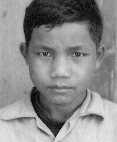 "You'd better have connections with the military commander or the police chief," another development organization official warned. My heart jumped when I heard that a Western journalist had just returned from Pailin, only to fall when I heard that she had paid $100 a day to six armed soldiers to protect her. Finally, I met an official from a de-mining organization who had just returned from Pailin. Except for the poor quality of the road it was safe to travel, he said.
"You'd better have connections with the military commander or the police chief," another development organization official warned. My heart jumped when I heard that a Western journalist had just returned from Pailin, only to fall when I heard that she had paid $100 a day to six armed soldiers to protect her. Finally, I met an official from a de-mining organization who had just returned from Pailin. Except for the poor quality of the road it was safe to travel, he said.
The driver shoehorned ten people and their cargo inside the pickup truck. Four military police lugging B40 rockets somehow wedged themselves in the back (soldiers get to ride for free in Cambodia). I found myself less alarmed by the possibility that the jarring road would trigger a rocket than hopeful that their presence would deter a possible Khmer Rouge attack.
|
|
|
|
The road
to Pailin cut through a former war zone, and the territory remained heavily mined. We passed mile after mile of red cord and unmistakable skull and crossbones "Danger -- Mines" signs. Where the red cord stopped, blue tents and thatched huts often sprung up: the "temporary" homes of tens of thousands of people who lost their land due to fighting between the government and Khmer Rouge.
Soldiers manning the checkpoints on the road to Pailin were only concerned with the "toll," usually about 50 U.S. cents per soldier. The vegetation had changed from rice fields to a thick jungle of palms, coconuts, mango and banana trees. As we neared Khmer Rouge territory, the checkpoints increased in frequency until one seemed to materialize every half kilometer. "Why so many checkpoints? Security?" I asked. "Money," the driver laughed.
After a particularly long stretch of empty road and impenetrable jungle, we came to a checkpoint. "Khmer Rouge," my interpreter murmured. Our driver exited to pay the toll. A soft-spoken Khmer Rouge soldier approached the car and gestured for me to accompany him to the nearby hut. "Your purpose?" "Tourism." "Nationality?" "American." They requested a business card which they hung on the outside of the hut. We passed through several other Khmer Rouge checkpoints but didn't stop to pay a toll. "Khmer Rouge are more disciplined than CPP soldiers," the driver explained. "The first checkpoint shares the money with all of the other soldiers."
The road deteriorated even further. We drove through tire-deep mud, often fish-tailing down hills and rolling back to gain momentum for the next boggy incline. We bounced across a river where the water came halfway up the doors, and then, five hours after leaving Battambang, we arrived in Pailin.
|
|
Lost the Battle, but Won the War?
|
|
|
Pailin is home
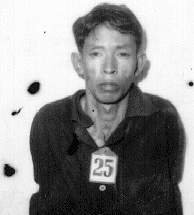 to several thousand former Khmer Rouge troops and Ieng Sary, one of the top leaders of the Khmer Rouge. Sary and Pol Pot studied together in Paris in the mid-1940s and became intimate friends, revolutionaries and, later, brothers-in-law. Sary had been foreign minister, vice prime minister and standing committee member of the Khmer Rouge government.
to several thousand former Khmer Rouge troops and Ieng Sary, one of the top leaders of the Khmer Rouge. Sary and Pol Pot studied together in Paris in the mid-1940s and became intimate friends, revolutionaries and, later, brothers-in-law. Sary had been foreign minister, vice prime minister and standing committee member of the Khmer Rouge government.
After Vietnam invaded Cambodia in 1979, it assigned blame for the genocide to only two Khmer Rouge leaders -- Pol Pot and Ieng Sary. Both were sentenced to death in abstentia. Sary has denied his culpability in the genocide. Pol Pot made all the decisions, he claimed. Others just carried them out. "I have no remorse because I never killed anyone, nor did I ever make a decision or suggest to Angkar to do so never at all," he said. Angkar, or 'the organization,' is the Khmer Rouge's euphemism for the government of the Democratic Kampuchea.
Ieng Sary and his troops -- 40-50 percent of the Khmer Rouge's total force -- defected from Pol Pot's leadership to the government in 1996. Tucked in the malaria-ridden jungles of northern Cambodia, Pol Pot vehemently opposed the possibility of joining his forces with either prime minister, but defections continued and the organization splintered beyond repair. He ordered the assassination of supporters of the alliance, including long-time Khmer Rouge Defense Minister Son Sen and his family. In the aftermath, the one-legged army commander Ta Mok (nicknamed 'The Butcher') arrested Pol Pot. Khmer Rouge cadres sentenced their former leader to life imprisonment.
Cambodia's two prime ministers arranged a royal amnesty for Sary. Since then, he has set up his own political party, and it will likely win at least one seat in the upcoming national elections scheduled for July. If he wins, Sary will at long last be united with his former Khmer Rouge cadres: former Khmer Rouge commander Hun Sen as well as ministers, members of parliament, bureaucrats, military personnel and policemen. In stark contrast, it is unlikely that First Prime Minister Norodom Ranariddh, who won the 1993 elections, will be able to stand in the elections.
|
|
|
|
Pailin was much
more wealthy than I had expected with all of the development occurring within the last year. When Ieng Sary defected to the government, the town of roughly 30,000 people had only one dirt road, no restaurants and no central market. Less than a year later, there were more than 20 noodle shops, and the central market was stocked with soap, cosmetics, clothes, even stereo equipment. Vendors disdained US dollars, the accepted currency throughout the rest of Cambodia, in favor of Thai baht, the country 20 kilometers to the west.
T'bong. The word was on everyone's lips. Gems. Pailin was notorious for being a Khmer Rouge stronghold, and famous for its gems. Ieng Sary sold millions of dollars in gem and logging concessions in Pailin to Thai companies to support his fiefdom. Ten thousand Cambodians had rushed here over the past year to find rubies, emeralds and sapphires. Barren tracts from Thai mining companies scarred the area.
With stooped figures dotting streets, fields and hills, it looked as if the entire population was searching for lost contact lenses. These fortune hunters sifted, shoveled and fingered the mud, somehow knowing how to avoid unmarked but mined areas as they. I ran into a young couple from central Cambodia who had been gem hunting in Pailin for a month, but so far with no luck. I happened upon a trio of soldiers. One had just found a pinkish ruby, nearly the size of his thumbnail, and was inspecting its purity in the sunlight.
I visited the head monk of Pailin's main pagoda and asked him about religious freedom, but his real interest lay elsewhere. I mentioned 'gems' and he shifted out of serenity into wide-eyed excitement. "Monks who are good monks and who follow the rules find many gems," he said. "You must climb that hill. So many gems. Walk slowly!" he called after my interpreter and me. "Keep your eyes on the ground!"
|
|
"They send people to listen outside your window"
|
|
|
Pailin was safe,
residents said. Many shuddered over the prospects of living in the anarchy of Battambang or Phnom Penh. Only active soldiers possess guns in Pailin, they said. Not civilians. Sure they were poor, they boasted, but crime, beggars and prostitutes were nonexistent. Earlier that year, wives banned together to burn down a newly constructed brothel; so far, none had replaced it -- indeed, a rare phenomenon in Cambodia.
Political opposition remained unthinkable. "The authorities sometimes listen to you," said a restaurant owner. "They send people to listen outside your window." I was told that a nearby prison meted out harsh sentences, including the death penalty for murder. In this authoritarian environment, it was the consensus that Ieng Sary was innocent of allegations of genocide.
We ate dinner in a noodle shop where the clientele was more interested in dubbed kung fu videos from Hong Kong than the culinary experience. A trio of open-mouthed young mothers carrying their toddlers stood on the periphery, dumbfounded by the characters' improbable acrobatics. An announcer periodically interrupted a public loudspeaker's broadcast of ear-splitting 1960s Khmer music to proclaim the evening's festivities: kick-boxing. We couldn't resist attending.
The sponsors had constructed a crude wooden platform for the fighters and strung up blue plastic sheets along the perimeter. A stick fence separated those who paid to sit on stools from those who paid to stand. Moths and flying roaches swarmed around the two phosphorescent bulbs above the circling gladiators, while more than a thousand civilians, many sporting Calvin Klein caps, and uniformed soldiers cheered with every blow and kick. A boy and girl, both about 14, stepped into the ring, and the crowd went wild. It was a closely fought match. The boy pounded his opponent, but the girl kicked with strength and precision. "Be a man!" the spectators yelled. But that night the crowd was against him, and they broke into a frenzy when the referee held up the girl's arm in victory.
|
|
|
|
Nearly all
of Pailin's residents were perpetrators or victims of the Khmer Rouge regime. Many were both. I talked with nearly a dozen former Khmer Rouge soldiers. All of them denied their guilt in committing the atrocities.
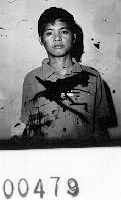 Sok Vuthy, 43, wore a dirty white T-shirt and green pants with the right trousers leg pinned up because his leg had been amputated. He used to be a soldier for the Khmer Rouge but now ran a small and languishing business in Pailin. Vuthy was born into a peasant family in a village in Kompong Cham Province, in eastern Cambodia. While growing up he entertained vague notions about eventually leaving the rice paddies to become a businessman.
Sok Vuthy, 43, wore a dirty white T-shirt and green pants with the right trousers leg pinned up because his leg had been amputated. He used to be a soldier for the Khmer Rouge but now ran a small and languishing business in Pailin. Vuthy was born into a peasant family in a village in Kompong Cham Province, in eastern Cambodia. While growing up he entertained vague notions about eventually leaving the rice paddies to become a businessman.
Instead, he volunteered to fight with the Khmer Rouge to support Prince Sihanouk in his fight against Prime Minister Lon Nol who had ousted the prince in a coup in 1971. "But I didn't know clearly about politics," Vuthy said. "I wasn't exactly sure why I was fighting." A corporal throughout the war, he was confident that the Khmer Rouge would eventually win, despite being undermanned and outgunned, because the people supported them. "They gave us food, and they told us where the enemy was." He considered himself neither a particularly brave nor a cowardly soldier; he simply obeyed his commander's orders. "If he went anywhere, I would go with him."
The fall of Phnom Penh made him very happy, and he thought Cambodia would finally see peace. Several months later, he was demobilized as a solider and returned to the rice paddies. As early as 1975, he was aware of Khmer Rouge atrocities in his village. "But I couldn't say anything to stop them or tell other people."
"Who do you blame for the killings?" I asked.
"There were many leaders, and lots of betrayal. Some leaders were allied with Vietnam. In reality, the killings can be blamed on the people of Hun Sen and the Vietnamese. It was not really Pol Pot who killed all the Khmer people, but the Vietnamese and Hun Sen." This was stock propaganda. Khmer Rouge leaders have motivated their rank and file to endure nearly 20 years of war and life in the jungle by fanning nationalistic and anti-Vietnamese flames.
"Pol Pot didn't trust people from Kompong Cham [province] because it was close to Vietnam," Vuthy continued. "Since I was from Kompong Cham, they also wanted to kill me. I was arrested and Pol Pot called me a spy for the Vietnamese and the Americans. In prison they made me work 19 hours everyday and they gave me only rice porridge to eat. I couldn't protest my innocence. I just waited to die." When fighting broke out with Vietnam, he was ordered to return to the battlefield. If he had refused to fight he would have been arrested again or executed, he claimed.
When Vietnam invaded Cambodia, he fled to the Thai border with several thousand other Khmer Rouge soldiers. Life on the border was difficult, he said, but easier than during 1975-1979. He continued fighting against the Vietnamese until he was injured in a "major Vietnamese campaign" near Battambang. He claimed that he was the only Khmer Rouge soldier injured, while 1000 Vietnamese died in the battle. Doctors amputated his leg at the pelvis. "I am not sorry at all [about the leg]. It is a sacrifice for the Cambodian people." It saddened Vuthy that many Khmer people died during the government offenses on Pailin in 1994 and 1995, but he remained violently nationalistic and hoped for a Cambodia cleansed of Vietnamese people. "I hate the Vietnamese because they killed many Cambodians."
"What do you think of the news about Pol Pot's trial?"
"I don't listen to that because I want to forget the past. My life is filled with suffering and sorrow. I spent almost my whole life in war. I don't think anything anymore. I only want a new life. A simple life."
During my year's stay in Cambodia I often encountered people who thought like Vuthy did. There was little independent thinking and no shades of complexity. Its logic seemed borne of the civil war when they learned to survive by absolute submission to those with power.
�
|
|
|
|
Pol Chanty,
a local official, continued the theme of blaming others for the atrocities. "We don't know who [among the Khmer Rouge] is responsible for killing so many Cambodian people and who was CIA or Vietnamese," he said.
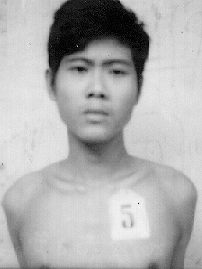 Nearly two million people dead and no one -- not even Pol Pot -- is blamed here. Pailin was united in hating the Vietnamese and denying responsibility for the genocide. Every former Khmer Rouge soldier I talked with in Pailin denied his guilt. "I was only following orders;" "If I objected, they would have killed me too; ""I didn't know about the killings until years later;" "It is Angkar which is to blame."
Nearly two million people dead and no one -- not even Pol Pot -- is blamed here. Pailin was united in hating the Vietnamese and denying responsibility for the genocide. Every former Khmer Rouge soldier I talked with in Pailin denied his guilt. "I was only following orders;" "If I objected, they would have killed me too; ""I didn't know about the killings until years later;" "It is Angkar which is to blame."
I met Chanty, 51, in a noodle shop where a brood of chickens strutted in and out searching for food. Rolling cigarettes from tobacco in a plastic bag, he appeared nervous and tense, answering the questions as briefly as possible. He kept his eyes trained on the interpreter.
Chanty's father was a soldier with the French protectorate forces, his mother a peasant. When he was 17, he became a Buddhist monk and lived in a pagoda until he was 28. "I didn't want to be a monk," he explained, "and I didn't like being a monk, but I wanted to show my gratitude to my parents for raising me." In 1974, when the Khmer Rouge gained control of the area, Chanty disrobed and was soon elected chief of a nearby village, in what was doubtless an election with a predetermined outcome. Although the Khmer Rouge would eliminate 95 percent of Cambodia's monk population -- roughly 25,000 people -- by 1979, Chanty claimed that the Angkar in his village respected his background because it made him a leader in the eyes of the people.
He didn't know much about the "movement" when he officially joined the Khmer Rouge, but he appreciated that Angkar eliminated prostitution, theft, gambling and alcohol. "As a village chief, I did nothing but go to meetings. I advised the villagers in a good way. I told them not to disobey Angkar or they would be punished." Five hundred families from Phnom Penh were transferred to his village, increasing its size to 1,200 families. Rice production fell; they had only rice gruel to eat.
After a year, he saw problems in the "movement." "One of my villagers was a very good man. He worked very hard and never broke any of Angkar's polices, but he was executed. I also saw [Khmer Rouge] guerrillas arresting people. I asked them if they had good reasons for arresting them. 'You are not allowed to ask', they said. 'If you don't understand, don't ask.' Some people -- 20 or 30 -- died of starvation, disease or were executed. I couldn't do anything because it was a dictatorship."
Chanty stepped down from his position as village chief, most likely because the Khmer Rouge decided to replace him with another cadre. He expected the future to become worse. "I became a primary school teacher, educating children about Cambodian culture and what is good and bad. When children were arrested, I had the right to ask the reason, but sometimes Angkar threatened me or said it's none of my business. Then I couldn't do anything to help." In 1979, Chanty fled to the Thai border to "meet Uncle Pol Pot because he would protect us from the Vietnamese." Chanty worked as a teacher in the jungle for 17 years.
Chanty initially welcomed the defeat of the Khmer Rouge in 1979. "It was good for the Khmer people because it stopped the killing," he said. After several years of Vietnam occupation, however, he came to believe that Cambodia needed the Khmer Rouge to return to fight the Vietnamese.
Buddhism teaches non-violence, and the vast majority of Cambodians seem, at least in first impression, friendly and gentle. How, then, could the Kingdom be so shockingly violent? "The Cambodian people have bad karma," Chanty said. "I will never support fighting between Khmer people -- only against the Vietnamese. Vietnam will take over Cambodia unless the Khmer people are united to fight against them. Vietnam is the only enemy. We hate the Vietnamese."
Nearly a year later, and Cambodia is bracing for a fresh round of violence leading up to the elections in July. There is little doubt among Cambodians that Hun Sen will remain in power, no matter the number of votes cast for the opposition. Pol Pot had long ago ceased to be a real threat to the government in Phnom Penh, but his legacy of rule by violence lives on.
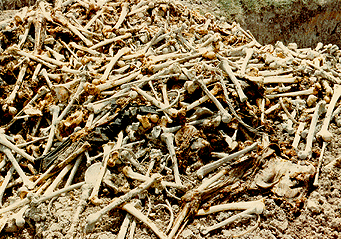
The exhumation of the Killing Fields at Choeung Ek in 1980 by the People's Republic of
Kampuchea was one of the first concrete proofs to the outside world that something terrible
had happened in Democratic Kampuchea.
Photo by Ben Kiernan, 1980.
Comments? Send a letter to the editor.
Albion Monitor May 18, 1998 (http://www.monitor.net/monitor)
All Rights Reserved.
Contact rights@monitor.net for permission to use in any format.
|

 "You'd better have connections with the military commander or the police chief," another development organization official warned. My heart jumped when I heard that a Western journalist had just returned from Pailin, only to fall when I heard that she had paid $100 a day to six armed soldiers to protect her. Finally, I met an official from a de-mining organization who had just returned from Pailin. Except for the poor quality of the road it was safe to travel, he said.
"You'd better have connections with the military commander or the police chief," another development organization official warned. My heart jumped when I heard that a Western journalist had just returned from Pailin, only to fall when I heard that she had paid $100 a day to six armed soldiers to protect her. Finally, I met an official from a de-mining organization who had just returned from Pailin. Except for the poor quality of the road it was safe to travel, he said.
 to several thousand former Khmer Rouge troops and Ieng Sary, one of the top leaders of the Khmer Rouge. Sary and Pol Pot studied together in Paris in the mid-1940s and became intimate friends, revolutionaries and, later, brothers-in-law. Sary had been foreign minister, vice prime minister and standing committee member of the Khmer Rouge government.
to several thousand former Khmer Rouge troops and Ieng Sary, one of the top leaders of the Khmer Rouge. Sary and Pol Pot studied together in Paris in the mid-1940s and became intimate friends, revolutionaries and, later, brothers-in-law. Sary had been foreign minister, vice prime minister and standing committee member of the Khmer Rouge government.
 Sok Vuthy, 43, wore a dirty white T-shirt and green pants with the right trousers leg pinned up because his leg had been amputated. He used to be a soldier for the Khmer Rouge but now ran a small and languishing business in Pailin. Vuthy was born into a peasant family in a village in Kompong Cham Province, in eastern Cambodia. While growing up he entertained vague notions about eventually leaving the rice paddies to become a businessman.
Sok Vuthy, 43, wore a dirty white T-shirt and green pants with the right trousers leg pinned up because his leg had been amputated. He used to be a soldier for the Khmer Rouge but now ran a small and languishing business in Pailin. Vuthy was born into a peasant family in a village in Kompong Cham Province, in eastern Cambodia. While growing up he entertained vague notions about eventually leaving the rice paddies to become a businessman.
 Nearly two million people dead and no one -- not even Pol Pot -- is blamed here. Pailin was united in hating the Vietnamese and denying responsibility for the genocide. Every former Khmer Rouge soldier I talked with in Pailin denied his guilt. "I was only following orders;" "If I objected, they would have killed me too; ""I didn't know about the killings until years later;" "It is Angkar which is to blame."
Nearly two million people dead and no one -- not even Pol Pot -- is blamed here. Pailin was united in hating the Vietnamese and denying responsibility for the genocide. Every former Khmer Rouge soldier I talked with in Pailin denied his guilt. "I was only following orders;" "If I objected, they would have killed me too; ""I didn't know about the killings until years later;" "It is Angkar which is to blame."
